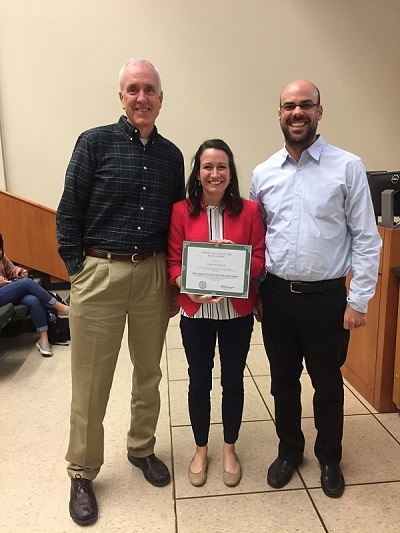Caitlin Leslie
Our third Baylor University WISE Graduate Student Seminar Speaker is Caitlin Leslie. Caitlin Leslie is working on her PhD with Dr. Joaquin Lugo in the Department of Geosciences here at Baylor University. Her talk is entitled “Reconstructing ancient climates and environments in the San Juan Basin, New Mexico.”
Summary: The San Juan Basin, located in northwestern New Mexico, contains extensive exposures of river floodplain deposits that formed in the early Paleocene, from about 66-62 million years ago. These deposits document the first several million years after the Cretaceous-Paleogene (K-Pg) extinction, which is when all non-avian dinosaurs went extinct. Thus, the deposits in the San Juan Basin preserve one of the best records of the rise to dominance of mammals following the K-Pg extinctions. Vertebrate paleontologists studying mammals have noted an interval about 4 million years after the K-Pg boundary when many species disappear and new species appear. However, there has been little previous work focused on the possible drivers of this mammalian turnover. My research has focused on reconstructing the ancient climates and environments of this interval to better understand what is causing the significant change in the mammal community. My results indicate that there were two major, rapid warming events rapid 3-4°C that is contemporaneous with the disappearance of certain mammalian species and appearance of new species. The second warming event, or hyperthermal, occurs at ~63.3-63.2 Ma, which correlates to a warming event previously documented in marine deposits called the Late Danian Event, indicating it was a global warming event. The results of my research indicate that abrupt climate warming likely played an important role in causing turnover in the mammalian communities in the early Paleocene. This has important implications for terrestrial ecosystems in the future, and suggests that there will likely be major extinctions and changes in the species composition of mammalian communities in response to future warming.
 Above, picture from left to right, is Dr. Stacy Atchley, Caitlin Leslie, and Dr. Dan Peppe.
Above, picture from left to right, is Dr. Stacy Atchley, Caitlin Leslie, and Dr. Dan Peppe.